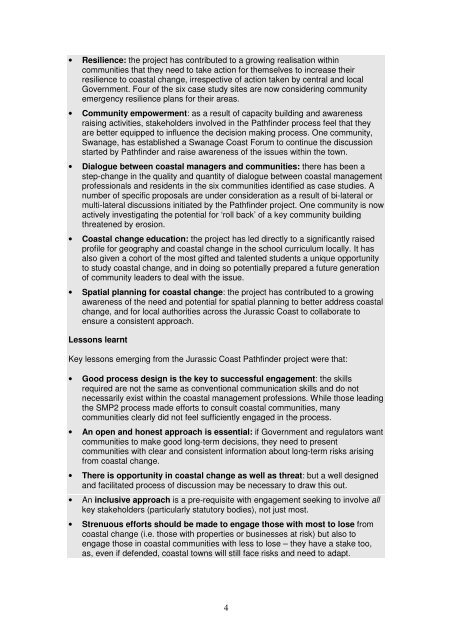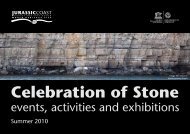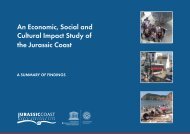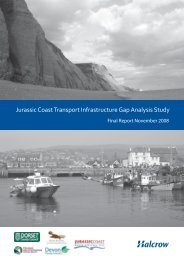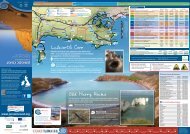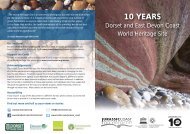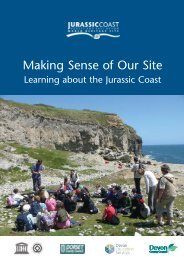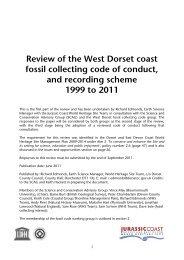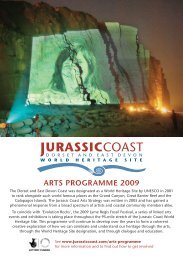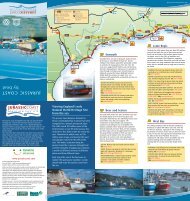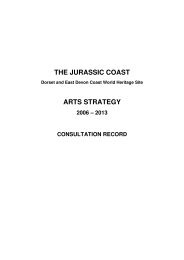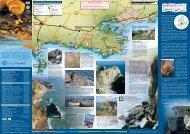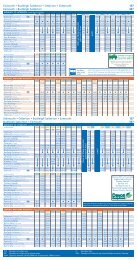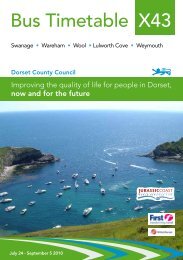Final Report to DEFRA - Jurassic Coast
Final Report to DEFRA - Jurassic Coast
Final Report to DEFRA - Jurassic Coast
You also want an ePaper? Increase the reach of your titles
YUMPU automatically turns print PDFs into web optimized ePapers that Google loves.
• Resilience: the project has contributed <strong>to</strong> a growing realisation within<br />
communities that they need <strong>to</strong> take action for themselves <strong>to</strong> increase their<br />
resilience <strong>to</strong> coastal change, irrespective of action taken by central and local<br />
Government. Four of the six case study sites are now considering community<br />
emergency resilience plans for their areas.<br />
• Community empowerment: as a result of capacity building and awareness<br />
raising activities, stakeholders involved in the Pathfinder process feel that they<br />
are better equipped <strong>to</strong> influence the decision making process. One community,<br />
Swanage, has established a Swanage <strong>Coast</strong> Forum <strong>to</strong> continue the discussion<br />
started by Pathfinder and raise awareness of the issues within the <strong>to</strong>wn.<br />
• Dialogue between coastal managers and communities: there has been a<br />
step-change in the quality and quantity of dialogue between coastal management<br />
professionals and residents in the six communities identified as case studies. A<br />
number of specific proposals are under consideration as a result of bi-lateral or<br />
multi-lateral discussions initiated by the Pathfinder project. One community is now<br />
actively investigating the potential for ‘roll back’ of a key community building<br />
threatened by erosion.<br />
• <strong>Coast</strong>al change education: the project has led directly <strong>to</strong> a significantly raised<br />
profile for geography and coastal change in the school curriculum locally. It has<br />
also given a cohort of the most gifted and talented students a unique opportunity<br />
<strong>to</strong> study coastal change, and in doing so potentially prepared a future generation<br />
of community leaders <strong>to</strong> deal with the issue.<br />
• Spatial planning for coastal change: the project has contributed <strong>to</strong> a growing<br />
awareness of the need and potential for spatial planning <strong>to</strong> better address coastal<br />
change, and for local authorities across the <strong>Jurassic</strong> <strong>Coast</strong> <strong>to</strong> collaborate <strong>to</strong><br />
ensure a consistent approach.<br />
Lessons learnt<br />
Key lessons emerging from the <strong>Jurassic</strong> <strong>Coast</strong> Pathfinder project were that:<br />
• Good process design is the key <strong>to</strong> successful engagement: the skills<br />
required are not the same as conventional communication skills and do not<br />
necessarily exist within the coastal management professions. While those leading<br />
the SMP2 process made efforts <strong>to</strong> consult coastal communities, many<br />
communities clearly did not feel sufficiently engaged in the process.<br />
• An open and honest approach is essential: if Government and regula<strong>to</strong>rs want<br />
communities <strong>to</strong> make good long-term decisions, they need <strong>to</strong> present<br />
communities with clear and consistent information about long-term risks arising<br />
from coastal change.<br />
• There is opportunity in coastal change as well as threat: but a well designed<br />
and facilitated process of discussion may be necessary <strong>to</strong> draw this out.<br />
• An inclusive approach is a pre-requisite with engagement seeking <strong>to</strong> involve all<br />
key stakeholders (particularly statu<strong>to</strong>ry bodies), not just most.<br />
• Strenuous efforts should be made <strong>to</strong> engage those with most <strong>to</strong> lose from<br />
coastal change (i.e. those with properties or businesses at risk) but also <strong>to</strong><br />
engage those in coastal communities with less <strong>to</strong> lose – they have a stake <strong>to</strong>o,<br />
as, even if defended, coastal <strong>to</strong>wns will still face risks and need <strong>to</strong> adapt.<br />
4


